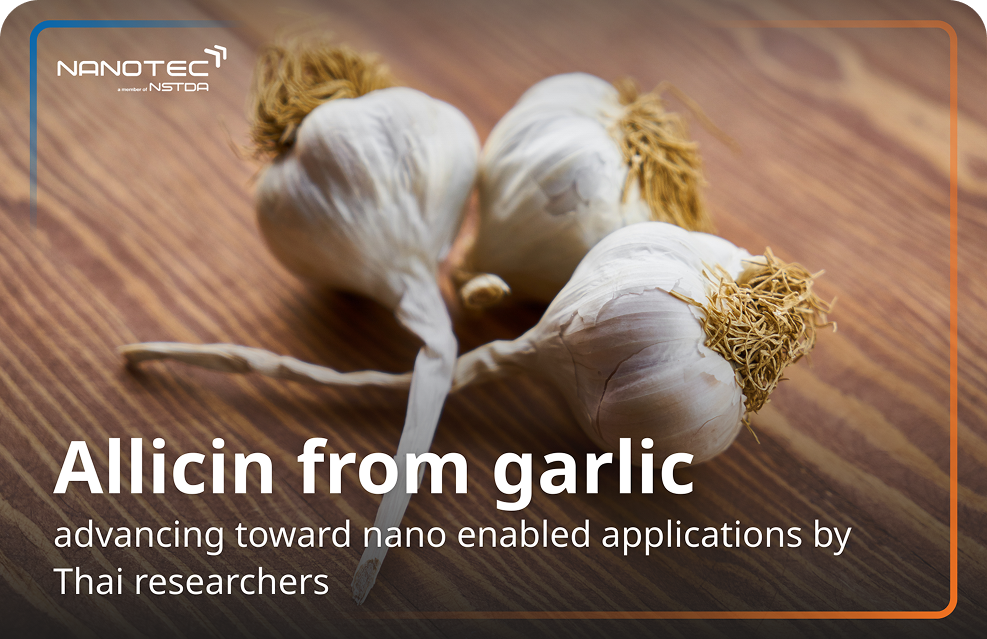Garlic is an herbal plant that humans have used for medicinal purposes for centuries. Its principal bioactive compound, allicin, is widely recognized in medical and scientific literature for broad health benefits. Studies report that allicin exhibits antioxidant activity, anticancer potential, immune modulation, antiplatelet effects, blood pressure–lowering effects, lipid and cholesterol reduction, and support for glycemic control. It also shows inhibitory activity against a range of bacteria and viruses, making garlic of interest in both medicine and the dietary supplements industry.
However, a key challenge of allicin is its instability, as it readily degrades when exposed to moisture or elevated temperature, making it difficult to store and to fully utilize in finished products.
Transforming allicin with nanotechnology
To address these limitations, researchers at the National Nanotechnology Center (NANOTEC) under the National Science and Technology Development Agency (NSTDA) have developed an innovation that leverages nanoscale technology to encapsulate and control the release of allicin by formulating it as lipid nanoparticles.
These nanoparticles act as tiny capsules that encapsulate garlic extract and its key active allicin, protecting it from moisture- and heat-induced degradation. They enable controlled release of the active compounds, extending their residence time and improving efficacy. This innovation not only addresses allicin’s instability but also expands commercial opportunities across the dietary supplement, health, and medical sectors.
Research Highlights to Watch
Preliminary laboratory studies found that nanoencapsulated garlic extract inhibited colorectal cancer cells more effectively than both conventional garlic extract and blank nanoparticles without active loading. This indicates that the technology genuinely enhances the bioactivity of allicin and marks an important step in advancing Thai herbal medicine toward health innovation.
In addition, NANOTEC has developed a nanoparticle bead formulation for oral administration, engineered for release in the intestine to enhance absorption. This approach better preserves the integrity and bioactivity of allicin and improves its practical use in dietary supplements and health innovations.
Allicin a bioactive with wide-ranging benefits
Peer-reviewed studies in Thailand and abroad report that allicin exhibits the properties below:
- Antioxidant, reduces cellular degeneration and supports healthy aging
- Anti-cancer, inhibits the growth of multiple cancer cell types such as colorectal and breast
- Immune booster, stimulates immune cell activity
- Lipid and cholesterol regulation, helps lower cardiovascular risk
- Anti-inflammatory and wound-healing, supports tissue repair and recovery
- Antiplatelet, reduces platelet aggregation and lowers the risk of thrombosis
- Antimicrobial, inhibits a broad range of bacteria fungi and viruses
Allicin from garlic is a key bioactive with significant health value, yet its inherent instability poses challenges for commercial use. Research at the National Nanotechnology Center (NANOTEC) under the National Science and Technology Development Agency (NSTDA) demonstrates a new approach that applies nanotechnology to formulate allicin as lipid nanoparticles and nano beads, enhancing encapsulation, enabling controlled release, and prolonging bioactivity. Laboratory results confirm that this technology strengthens allicin’s ability to inhibit cancer cells and augments its overall health benefits.


